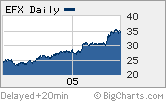 |
| Give credit where it's due: Shares of credit bureau Equifax have surged during the past year. |
|
|
|
|
|
|
|
|
|
NEW YORK (CNN/Money) – Identity theft. It's scary.
It seems like every other day, there's a report about how customer data has been stolen from a big bank, retailer or employer. For the average consumer, the thought of what some cyberpunk criminal could do using your Social Security number is certainly worrisome to say the least.
But for investors in credit reporting agency Equifax, the recent raft of prominent data breaches could spell opportunity. Equifax (Research), the only publicly traded firm among the major credit bureaus, has enjoyed a nice pop this year, gaining 25 percent in what's been a turbulent market.
And some money managers think the stock is still a buy.
"There is certainly a heightened awareness of identity theft. People are being encouraged to watch what's going on and monitor their credit reports and I don't think that's going to subside," said Carl Marker, manager of the IMS Capital Value fund, which owned about 70,000 shares of Equifax as of the end of March, according to FactSet Research.
ID theft fears could be a boon
Equifax, along with TransUnion and Experian, keeps track of credit histories. Consumers used to have to pay a fee to these agencies any time they wanted to check their credit. But due to a relatively new law known as The Fair and Accurate Credit Transactions Act (FACTA), consumers are now allowed one free credit report a year from each agency.
That has led to a concern that Equifax could lose revenues from its consumer business, which sells credit reports directly to individuals. But these worries may be overdone.
For one, Equifax generates only about 10 percent of its total sales from its direct consumer business in North America.
And some think the law could boost the consumer business -- once someone gets his first report, he may get in the habit of checking his credit more frequently .
"My sense is that people may want to get more than one a year," said Bob Millen, co-manager of the Jensen Portfolio fund, which owned nearly 4 million shares of Equifax as of the end of February, according to FactSet Research.
Sales from Equifax's consumer business increased 19 percent from a year ago in the first quarter, making it the most rapidly growing of its three main divisions in North America.
Stock still looks attractive....especially if consumers keep spending
Equifax generates the rest of its revenues from selling credit reports and credit scores to banks and other financial services firms and direct marketing services in North America; it also does business in Latin America and Europe.
Selling credit information to corporations in North America is by far the company's most lucrative business, accounting for 56 percent of sales in the first quarter and more than 80 percent of the company's operating profit.
Marker thinks that as long as consumers are still willing to spend -- and borrow to do so -- then this part of Equifax's business should remain extremely healthy.
"The biggest risk for Equifax is a weakening economy. If fewer people are going to the store to finance their washer and dryers than fewer credit checks would be run. But the economy looks pretty good," said Marker.
Equifax reported a better than expected profit in the first quarter. Analysts have raised their earnings estimates for all of 2005 and 2006 in recent months.
According to Thomson/First Call, analysts expect the company to report an earnings increase of 10 percent this year and 9 percent in 2006. That's steady, if not spectacular growth. But Equifax also raised its quarterly dividend by 33 percent last month, making the stock even more attractive for conservative investors.
In addition, Millen said he likes the fact that Equifax faces few competitive threats. "Equifax has credit records on more than 400 million people worldwide. There's a huge barrier to entry to get in this business," he said.
With that in mind, Millen still thinks the stock is fairly valued as well, trading at about 20 times 2005 earnings estimates. He points to the company's strong track record of generating robust returns on equity over the past few years as well as sizable amounts of cash flow as a reason that the stock remains attractive.
Worried about your credit? Click here for more personal finance news.
For a look at more markets news, click here.

|